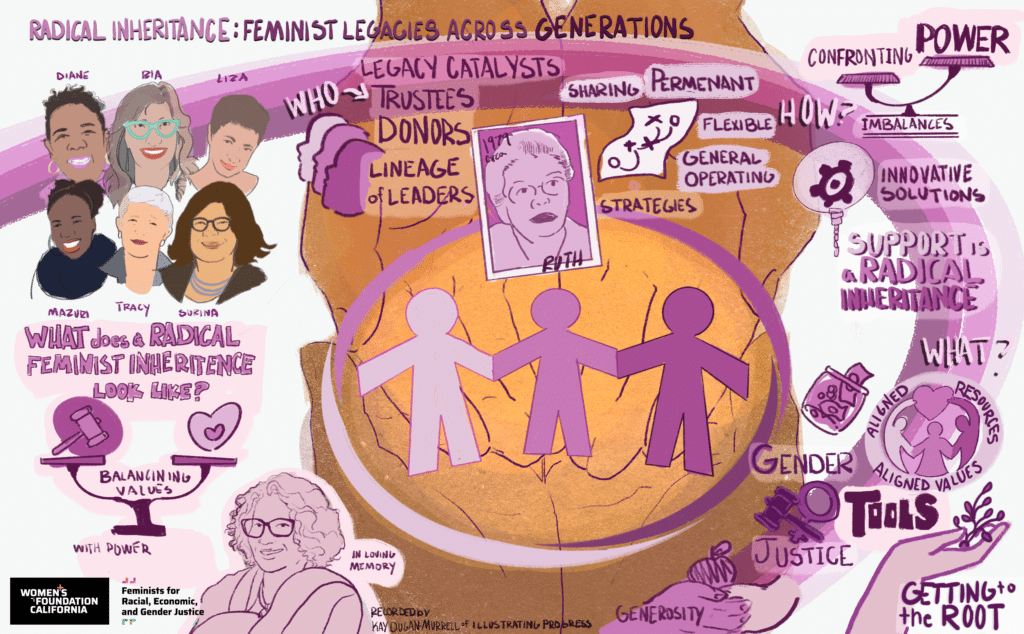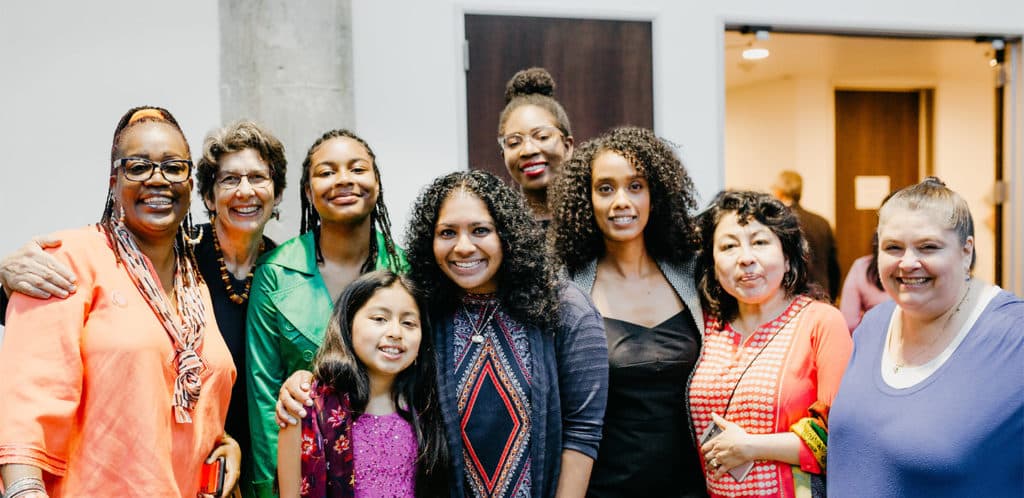Radical Inheritance:
Feminist Legacies Across Generations
Ruth McGuire Legacy Circle members are supporters who have written their feminist values into their wills, trusts, and estate plans by including the Women’s Foundation California as a beneficiary of a planned gift.
To learn more about joining the Ruth McGuire Legacy Circle, please contact Liza Siegler.


| Heather Appel Amanda Atchley Carol A. Banquer, MD Sara Behmerwohld Elizabeth L. Bremner Kathleen Brown Michelle Cale, DPhil Mazuri Colley Kathryn M. Downing Lee Draper, PhD Pat B. Etienne Cindy Ewing Rachel Gaines Tracy Gary Linda Gebroe |
Chrysolite Gulzaman Rosielee A. Jones Surina Khan & Jennifer Terry Kesa Kivel Susan Kokores Erin M. La Ninfa Sidne Long Melanie Lundquist Diane M. Manuel Paley Martin Huong Nguyen-Yap Judith A. Patrick Honorable Joy Picus Mary Frances Kelly Poh Vanessa I. Poster |
Christine Reyes Theadora Ricker Jennie P. Runde Mady Shumofsky Liza Siegler Cherrill M. Spencer Susan L. Swan Yesenia Teran Terri Thomas Belinda Walker Melissa S. Wayne Kate Wilson Bennett Wright 2 Anonymous Donors |
The Story of Ruth

Dr. Ruth McGuire held a vision for liberation that bridged generations and social movements. It was her community organizing and her promise of a future legacy gift that planted the seeds of the Women’s Foundation California. In her spirit and her vision, the Women’s Foundation California created the Ruth McGuire Legacy Circle following her death in 1996.
Ruth was a social worker and therapist specializing in older women, and an out lesbian and civil rights activist in the 1970’s in San Francisco.
With Pat Norman, Del Martin and Phylis Lyon, Ruth had been part of the Daughters of Bilitis (the first lesbian organization in the US and publishers of the Ladder magazine for lesbians, which they started in 1956.) Pat Norman went on found the Lesbian Mothers’ Union in 1971 and Ruth and she worked together at the Center for Special Problems, where Ruth was a counselor, and the SF Health Department, where Ruth was a trainer.
Ruth was in her sixties in 1977-1978 when she heard about the development of the Women’s Building and an early conference focused on violence against women. She reached out to Pat to help convene a multi-racial, cross-class group of women activists and to discuss what could help to build a stronger future.
Starting in 1979, they met at Ruth’s house in San Francisco for two years planning what goals and aspirations might be met by the development of a women’s foundation. In addition to Ruth and Pat, the group included Phyllis Lyon, Debbie Lee, Kathy Deamer, Suzanne Irwin-Wells, GG Greenhouse, Marya Grambs, Roma Guy, and Tracy Gary. They galvanized around the underfunding of organizations serving and led by women and girls, and the growing threat of the rise of the New Right. According to a Ford Foundation report at the time, only 1% of philanthropic dollars were directed to women and girls’ issues; President Carter had just come into office and the feminist movement was growing. But so too was the conservative movement.
Ruth felt as a person without children, that it was not only important to support feminist and lesbian organizations year by year, but to also help them build for the long-term. It was her idea to focus on how supporters could make giving to feminist organizations part of their legacies through planned gifts and bequests.
Ruth knew she was a part owner in an apartment building in the Northwest that she would be inheriting with her family of origin. She wanted to do something to leverage her inheritance and build a stronger future, so she bequeathed her inheritance to the Foundation as her legacy promise and pledge. She made her pledge in honor of her beloved friend, Louise Hoyt.
The value of “her share” of that building was estimated in 1980 at $300,000. Ruth’s commitment and faith in the future gave the founders the confidence to begin fundraising and operating the Women’s Foundation!
Ruth remained an honorary co-founder of the Foundation until the 1990’s. She retired in Texas, where she died in 1996. Nearly twenty years after she made her catalytic bequest pledge, the funds came to the Foundation. In 1999, the Ruth McGuire Legacy Circle (then Society) was named in her honor.
The Women’s Foundation’s origin and story sparked by Ruth McGuire’s vision and commitment to a feminist future stands as an inspiration for us today.